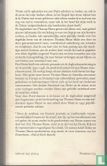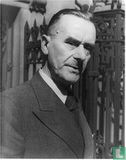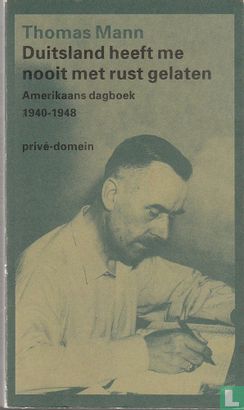Thomas Mann (Lübeck, June 6, 1875 - Zurich, August 12, 1955) was a German writer. He was awarded the Nobel Prize in Literature in 1929.
Thomas Mann was a younger brother of writer Heinrich Mann (1871-1950) and the son of the merchant Thomas Johann Heinrich Mann. His mother Julia (née da Silva-Bruhns) was half Brazilian. Three more children were born from this marriage: Julia (1877), Carla (1881) and Viktor (1890). Thomas later described his childhood as happy and carefree.
In 1891 his father died of bladder cancer. In his last will he had expressed that his own company and the family house had to be sold. After that, the Mann family lived on the interest from the sale.
During his school days, Thomas Mann showed no great interest in the lessons, although he was clearly very gifted. He preferred to write for the magazine Der Frühlingssturm, of which he became co-publisher in 1893. Thomas Mann was apparently well aware of his vocation as a literary teacher, as evidenced by a surviving letter from 1889 in which the 14-year-old closes with "Thomas Mann, lyrical-dramatic poet". In 1894 he left the gymnasium and moved to Munich, where his mother and the other children had lived for a year.
The guardian appointed after the death of Thomas Mann's father ordered Thomas to choose a civil profession after high school. He accepted this and decided to work for an insurance company. Mann regarded this activity as dull and unpretentious and there is an anecdote that remains uncontested to this day, that he was secretly engaged as a literate during his work. In 1894 Thomas Mann made his debut with the novella Gefallen, which was published in the magazine Wohlgefallen.
In 1895, Mann retired from the insurance company and began studying at the Technische Hochschule in Munich. He originally planned to learn for the profession of journalist. But the disinterest that he had already shown in his work at school, he continued in his studies. When Thomas Mann came of age at 21 and thus money from his father's inheritance became available (about 160 to 180 gold marks per year), he decided he had had enough of all the schools and institutions and established himself as an independent writer.
First publications:
Almost immediately after the thought had occurred to Mann to go to Italy with his brother Heinrich, they put their money where their mouth was. They wanted to go to Rome and in 1897 rented a house in Palestrina, which is east of the Italian capital. Mann wrote several novels at the time, including Der kleine Herr Friedemann. He also started work on his novel Buddenbrooks - Verfall einer Familie.
During this time, Mann also worked briefly for Das Zwanzigste Jahrhundert - Blätter für deutsche Art und Wohlfahrt, a German magazine with an anti-Semitic slant. Later he was not proud of this and was reluctant to answer questions about this period. His brother Heinrich was also a member of it for a short time. In 1898 Mann exchanged the magazine for the magazine Simplicissimus, of which he would remain an editor for a year. His first major novel, Buddenbrooks, was published in 1901, for which he was to receive the Nobel Prize in Literature in 1929. However, the novel De Toverberg (1924) is considered a highlight in his oeuvre, for which he was inspired, among other things, by the stay of his wife Katia Pringsheim in a Swiss sanatorium.
Partial bibliography:
1901: The Buddenbrooks
1903: Tonio Kröger and Other Stories
1903: Tristan
1909: Your Royal Highness
1912: Der Tod in Venedig (Death in Venice)
1918: Betrachtungen eines Unpolitischen
1919: Boss and dog
1924: The Magic Mountain
1933-1943: Joseph und seine Brüder
1939: Lotte in Weimar
1940: The Switched Heads: An Indian Legend
1944: The Law
1947: Doctor Faustus. The life of the German composer Adrian Leverkühn told by a friend.
1951: The Chosen One
1953: The Deceived
1954: Disappointments of the con artist Felix Krull
Children:
Erika Mann (1905-1969), actress, writer
Klaus Mann (1906-1949), writer
Golo Mann (1909-1994]), writer, historian
Monika Mann (1910-1992), writer
Elisabeth Mann Borgese (1918-2002), writer, lawyer
Michael Mann (1919-1977), musician, literary scholar
This text has been translated automatically from Dutch
Click here for the original text
Thomas Mann (Lübeck, 6 juni 1875 - Zürich, 12 augustus 1955) was een Duits schrijver. Hij kreeg in 1929 de Nobelprijs voor de Literatuur.
Thomas Mann was een jongere broer van schrijver Heinrich Mann (1871-1950) en de zoon van de koopman Thomas Johann Heinrich Mann. Zijn moeder Julia (geboren da Silva-Bruhns) was half Braziliaans. Uit dit huwelijk kwamen nog drie kinderen voort: Julia (1877), Carla (1881) en Viktor (1890). Thomas beschreef zijn kindertijd later als gelukkig en zorgeloos.
In 1891 stierf zijn vader aan de gevolgen van blaaskanker. In zijn laatste wil had hij geuit, dat zijn eigen opgerichte bedrijf en het familiehuis verkocht moesten worden. Daarna leefde de familie Mann van de rente van de verkoop.
In zijn schooltijd toonde Thomas Mann geen grote interesse in de lessen, hoewel hij duidelijk wel heel begaafd was. Hij schreef liever voor het tijdschrift Der Frühlingssturm, waarvan hij in 1893 mede-uitgever werd. Thomas Mann was zich blijkbaar erg bewust van zijn roeping als literator, zoals blijkt uit een bewaard gebleven brief uit 1889, waarin de 14-jarige afsluit met "Thomas Mann, lyrisch-dramatisch dichter". In 1894 verliet hij het gymnasium en verhuisde hij naar München, waar zijn moeder en de andere kinderen al sinds een jaar woonden.
De voogd die na de dood van Thomas Manns vader was aangesteld, bepaalde dat Thomas na het gymnasium een burgerlijk beroep zou kiezen. Hij accepteerde dit en besloot om voor een verzekeringsmaatschappij te gaan werken. Deze bezigheid beschouwde Mann als saai en pretentieloos en er bestaat een tot op de dag van vandaag onweersproken anekdote, dat hij tijdens zijn werk stiekem ook als literator bezig was. In 1894 debuteerde Thomas Mann met de novelle Gefallen, die in het tijdschrift Wohlgefallen werd gepubliceerd.
In 1895 stopte Mann met werken bij de verzekeringsmaatschappij en begon aan een studie aan de Technische Hochschule in München. Hij was oorspronkelijk van plan om voor het beroep van journalist te leren. Maar de ongeïnteresseerdheid die hij reeds in zijn werk op school had getoond, zette hij voort in zijn studie. Toen Thomas Mann op zijn 21ste meerderjarig werd en hem dus geld van zijn vaders erfenis ter beschikking kwam (ongeveer 160 tot 180 goldmark per jaar), besloot hij dat hij genoeg had van alle scholen en instituties en vestigde hij zich als onafhankelijk schrijver.
Eerste publicaties:
Vrijwel meteen nadat de gedachte bij Mann was opgekomen om samen met zijn broer Heinrich naar Italië te gaan, voegden ze de daad bij het woord. Ze wilden naar Rome en huurden in 1897 een huisje in Palestrina, dat ten oosten van de Italiaanse hoofdstad ligt. Mann schreef in die tijd enkele novellen, waaronder Der kleine Herr Friedemann. Ook begon hij aan zijn roman Buddenbrooks - Verfall einer Familie.
Mann werkte in deze tijd ook kort bij Das Zwanzigste Jahrhundert – Blätter für deutsche Art und Wohlfahrt, een Duits blad met een antisemitische inslag. Hij was daar later niet trots op en beantwoordde vragen over deze periode ongaarne. Ook zijn broer Heinrich was er korte tijd medewerker van. In 1898 verruilde Mann het blad voor het tijdschrift Simplicissimus, waarvan hij een jaar lang redacteur zou blijven. In 1901 verscheen zijn eerste grote roman, Buddenbrooks, waarvoor hij in 1929 de Nobelprijs voor de Literatuur zou ontvangen. Als een hoogtepunt in zijn oeuvre wordt echter de roman De Toverberg (1924) beschouwd, waarvoor hij zich onder meer liet inspireren door het verblijf van zijn echtgenote Katia Pringsheim in een Zwitsers sanatorium.
Gedeeltelijke bibliografie:
1901: De Buddenbrooks
1903: Tonio Kröger en andere verhalen
1903: Tristan
1909: Koninklijke hoogheid
1912: Der Tod in Venedig (Dood in Venetië)
1918: Betrachtungen eines Unpolitischen
1919: Baas en hond
1924: De Toverberg
1933-1943: Joseph und seine Brüder
1939: Lotte in Weimar
1940: De verwisselde hoofden: een Indische legende
1944: De wet
1947: Doctor Faustus. Het leven van de Duitse toondichter Adrian Leverkühn verteld door een vriend.
1951: De uitverkorene
1953: De bedrogene
1954: Ontboezemingen van de oplichter Felix Krull
Kinderen:
Erika Mann (1905-1969), actrice, schrijver
Klaus Mann (1906-1949), schrijver
Golo Mann (1909-1994]), schrijver, geschiedkundige
Monika Mann (1910-1992), schrijver
Elisabeth Mann Borgese (1918-2002), schrijver, jurist
Michael Mann (1919-1977), musicus, literatuurwetenschapper











